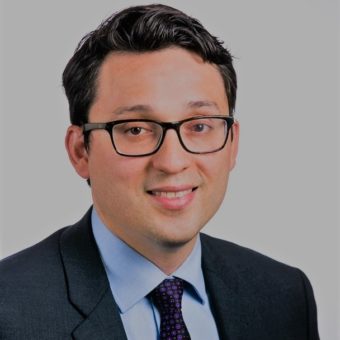Jose Figueroa, MD, MPH continues to drive the kind of groundbreaking work that will change health policy and practice. Since becoming the first Rappaport awardee, Dr. Figueroa has been promoted to key leadership positions at both BWH and Harvard. He is a junior faculty member at Harvard Medical School, where he manages an ambitious research portfolio through the Harvard T.H. Chan School of Public Health’s Global Health Institute. He is a practicing internist at BWH, where he maintains a half-time clinical practice. In addition, Dr. Figueroa was named the Director of the Medical Management Leadership Track (MLT) in 2014, where he works alongside Joel Katz, MD, to lead this unique program.
The MLT promotes a clinician-manager leadership career path by cultivating innovative thought leaders who will elevate practices in healthcare management while becoming skilled, compassionate clinicians. Participants gain a concentrated three-year experience that includes core concepts of hospital management, rotations in everything from health insurance to drug development, and mentorship from leading experts in a variety of relevant fields. They also complete a longitudinal project focused on solving a specific problem in healthcare delivery. One of only a few such programs in the country, the MLT is growing at a remarkable rate, with applications doubling last year from 10 to 20 residents, or 40% of the internal medicine residency program. “Students want to be more than just ‘a clinician,’” says Dr. Figueroa. “We wanted to give them an avenue where they could keep growing and expand their interests.”
Dr. Figueroa is spearheading efforts to advance the program’s four pillars—policy, leadership, quality, and innovation—strengthening its ability to boost graduates directly into key positions in healthcare policy and management. He has shifted the focus of the previously lecture-based program to include more exposure to high-level thought leaders in the field. Participants travel to the Massachusetts State House and Washington D.C., giving them direct access to individuals who are shaping healthcare at the local and national levels. In addition, Dr. Figueroa has introduced a consulting component to the program, which allows the senior MLT class to act as a consulting group for proposed initiatives at BWH. The group has already advised on ideas such as the patient medication hub—similar in concept to an ATM—proposed by EPIC pharmacy staff. This multidisciplinary curriculum positions residents for career advancement through the resulting contacts and conversations.
In addition to his leadership in the MLT, Dr. Figueroa is managing three key research projects through Harvard. Currently, he is investigating three federal pay-for-performance programs in hospitals across the country. Early analyses suggest that hospitals who serve the most vulnerable patients receive the largest penalties under these programs, while more affluent hospitals are incentivized to turn away cases that could result in poor evaluations. In addition, the most frequently penalized hospitals are often cash-poor and unable to finance new programs for vulnerable patients, many of whom rely on these hospitals as their only point of care. Dr. Figueroa hopes his research will demonstrate how shifts in evaluations and incentives can better-equip hospitals to serve vulnerable patient populations.
Dr. Figueroa is also researching the differences in healthcare experiences between minority and non-minority patients by analyzing data from both minority and non-minority patients. By identifying the practices that improve patients’ experiences of medical care, he can develop best practices designed to cultivate stronger patient-physician relationships, increase treatment compliance, and reduce post-discharge complications. Lastly, Dr. Figueroa is investigating recent cost increases for high-need Medicare patients to determine what is driving these spikes and how to contain them without compromising the quality of care.

